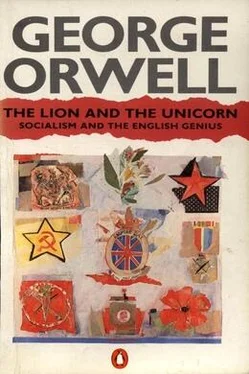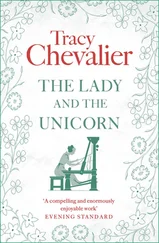George Orwell - The Lion and the Unicorn
Здесь есть возможность читать онлайн «George Orwell - The Lion and the Unicorn» весь текст электронной книги совершенно бесплатно (целиком полную версию без сокращений). В некоторых случаях можно слушать аудио, скачать через торрент в формате fb2 и присутствует краткое содержание. Год выпуска: 2018, Издательство: epubBooks Classics, Жанр: История, Публицистика, на английском языке. Описание произведения, (предисловие) а так же отзывы посетителей доступны на портале библиотеки ЛибКат.
- Название:The Lion and the Unicorn
- Автор:
- Издательство:epubBooks Classics
- Жанр:
- Год:2018
- ISBN:нет данных
- Рейтинг книги:3 / 5. Голосов: 1
-
Избранное:Добавить в избранное
- Отзывы:
-
Ваша оценка:
- 60
- 1
- 2
- 3
- 4
- 5
The Lion and the Unicorn: краткое содержание, описание и аннотация
Предлагаем к чтению аннотацию, описание, краткое содержание или предисловие (зависит от того, что написал сам автор книги «The Lion and the Unicorn»). Если вы не нашли необходимую информацию о книге — напишите в комментариях, мы постараемся отыскать её.
was written in London during the worst period of the blitz. It is vintage Orwell, a dynamic outline of his belief in socialism, patriotism and an English revolution. His fullest political statement, it has been described as ‘
’ and is as relevant now as it ever has been.
The Lion and the Unicorn — читать онлайн бесплатно полную книгу (весь текст) целиком
Ниже представлен текст книги, разбитый по страницам. Система сохранения места последней прочитанной страницы, позволяет с удобством читать онлайн бесплатно книгу «The Lion and the Unicorn», без необходимости каждый раз заново искать на чём Вы остановились. Поставьте закладку, и сможете в любой момент перейти на страницу, на которой закончили чтение.
Интервал:
Закладка:
Outside the Labour Party there existed several extremist parties, of whom the Communists were the strongest. The Communists had considerable influence in the Labour Party in the years 1920–26 and 1935–9. Their chief importance, and that of the whole left wing of the Labour movement, was the part they played in alienating the middle classes from Socialism.
The history of the past seven years has made it perfectly clear that Communism has no chance in western Europe. The appeal of Fascism is enormously greater. In one country after another the Communists have been rooted out by their more up–to–date enemies, the Nazis. In the English–speaking countries they never had a serious footing. The creed they were spreading could appeal only to a rather rare type of person, found chiefly in the middle–class intelligentsia, the type who has ceased to love his own country but still feels the need of patriotism, and therefore develops patriotic sentiments towards Russia. By 1940, after working for twenty years and spending a great deal of money, the British Communists had barely 20,000 members, actually a smaller number than they had started out with in 1920. The other Marxist parties were of even less importance. They had not the Russian money and prestige behind them, and even more than the Communists they were tied to the nineteenth–century doctrine of the class war. They continued year after year to preach this out–of–date gospel, and never drew any inference from the fact that it got them no followers.
Nor did any strong native Fascist movement grow up. Material conditions were not bad enough, and no leader who could be taken seriously was forthcoming. One would have had to look a long time to find a man more barren of ideas than Sir Oswald Mosley. He was as hollow as a jug. Even the elementary fact that Fascism must not offend national sentiment had escaped him. His entire movement was imitated slavishly from abroad, the uniform and the party programme from Italy and the salute from Germany, with the Jew–baiting tacked on as an afterthought, Mosley having actually started his movement with Jews among his most prominent followers. A man of the stamp of Bottomley or Lloyd George could perhaps have brought a real British Fascist movement into existence. But such leaders only appear when the psychological need for them exists.
After twenty years of stagnation and unemployment, the entire English Socialist movement was unable to produce a version of Socialism which the mass of the people could even find desirable. The Labour Party stood for a timid reformism, the Marxists were looking at the modern world through nineteenth–century spectacles. Both ignored agriculture and imperial problems, and both antagonized the middle classes. The suffocating stupidity of left–wing propaganda had frightened away whole classes of necessary people, factory managers, airmen, naval officers, farmers, white–collar workers, shopkeepers, policemen. All of these people had been taught to think of Socialism as something which menaced their livelihood, or as something seditious, alien, 'anti–British' as they would have called it. Only the intellectuals, the least useful section of the middle class, gravitated towards the movement.
A Socialist Party which genuinely wished to achieve anything would have started by facing several facts which to this day are considered unmentionable in left–wing circles. It would have recognized that England is more united than most countries, that the British workers have a great deal to lose besides their chains, and that the differences in outlook and habits between class and class are rapidly diminishing. In general, it would have recognized that the old–fashioned 'proletarian revolution' is an impossibility. But all through the between–war years no Socialist programme that was both revolutionary and workable ever appeared; basically, no doubt, because no one genuinely wanted any major change to happen. The Labour leaders wanted to go on and on, drawing their salaries and periodically swapping jobs with the Conservatives. The Communists wanted to go on and on, suffering a comfortable martyrdom, meeting with endless defeats and afterwards putting the blame on other people. The left–wing intelligentsia wanted to go on and on, sniggering at the Blimps, sapping away at middle–class morale, but still keeping their favoured position as hangers–on of the dividend–drawers. Labour Party politics had become a variant of Conservatism, 'revolutionary' politics had become a game of make–believe.
Now, however, the circumstances have changed, the drowsy years have ended. Being a Socialist no longer means kicking theoretically against a system which in practice you are fairly well satisfied with. This time our predicament is real. It is 'the Philistines be upon thee, Samson'. We have got to make our words take physical shape, or perish. We know very well that with its present social structure England cannot survive, and we have got to make other people see that fact and act upon it. We cannot win the war without introducing Socialism, nor establish Socialism without winning the war. At such a time it is possible, as it was not in the peaceful years, to be both revolutionary and realistic. A Socialist movement which can swing the mass of the people behind it, drive the pro–Fascists out of positions of control, wipe out the grosser injustices and let the working class see that they have something to fight for, win over the middle classes instead of antagonizing them, produce a workable imperial policy instead of a mixture of humbug and Utopianism, bring patriotism and intelligence into partnership—for the first time, a movement of such a kind becomes possible.
II
The fact that we are at war has turned Socialism from a text–book word into a realizable policy.
The inefficiency of private capitalism has been proved all over Europe. Its injustice has been proved in the East End of London. Patriotism, against which the Socialists fought so long, has become a tremendous lever in their hands. People who at any other time would cling like glue to their miserable scraps of privilege, will surrender them fast enough when their country is in danger. War is the greatest of all agents of change. It speeds up all processes, wipes out minor distinctions, bring realities to the surface. Above all, war brings it home to the individual that he is not altogether an individual. It is only because they are aware of this that men will die on the field of battle. At this moment it is not so much a question of surrendering life as of surrendering leisure, comfort, economic liberty, social prestige. There are very few people in England who really want to see their country conquered by Germany. If it can be made clear that defeating Hitler means wiping out class privilege, the great mass of middling people, the £6 a week to £2,000 a year class, will probably be on our side. These people are quite indispensable, because they include most of the technical experts. Obviously the snobbishness and political ignorance of people like airmen and naval officers will be a very great difficulty. But without those airmen, destroyer commanders, etc. etc. we could not survive for a week. The only approach to them is through their patriotism. An intelligent Socialist movement will use their patriotism, instead of merely insulting it, as hitherto.
But do I mean that there will be no opposition? Of course not. It would be childish to expect anything of the kind.
There will be a bitter political struggle, and there will be unconscious and half–conscious sabotage everywhere. At some point or other it may be necessary to use violence. It is easy to imagine a pro–Fascist rebellion breaking out in, for instance, India. We shall have to fight against bribery, ignorance and snobbery. The bankers and the larger businessmen, the landowners and dividend–drawers, the officials with their prehensile bottoms, will obstruct for all they are worth. Even the middle classes will writhe when their accustomed way of life is menaced. But just because the English sense of national unity has never disintegrated, because patriotism is finally stronger than class–hatred, the chances are that the will of the majority will prevail. It is no use imagining that one can make fundamental changes without causing a split in the nation; but the treacherous minority will be far smaller in time of war than it would be at any other time.
Читать дальшеИнтервал:
Закладка:
Похожие книги на «The Lion and the Unicorn»
Представляем Вашему вниманию похожие книги на «The Lion and the Unicorn» списком для выбора. Мы отобрали схожую по названию и смыслу литературу в надежде предоставить читателям больше вариантов отыскать новые, интересные, ещё непрочитанные произведения.
Обсуждение, отзывы о книге «The Lion and the Unicorn» и просто собственные мнения читателей. Оставьте ваши комментарии, напишите, что Вы думаете о произведении, его смысле или главных героях. Укажите что конкретно понравилось, а что нет, и почему Вы так считаете.












